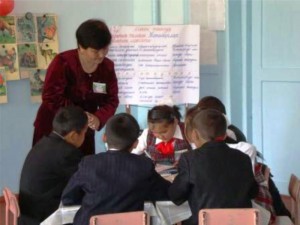Kyrgyz children are being given the chance to take a hands on approach to learning and they like it. USAID-funded training that emphasizes “Quality Learning is the Basis for Essential Skills” is making a difference, Teachers are learning to establish objectives for their lesson plans and to measure the effectiveness of lessons by embracing self and peer assessment among students. Kochobaev Omurbek, the deputy director of the Osh ITTI teacher training institute underscored, “I thought to myself – we are not working in vain. I have seen the outcomes of our efforts. The lessons I observed during the conference reinforced my commitment. Seeing the results of one’s efforts always empowers one to continue one’s efforts,"
USAID’s Quality Learning Project is helping teachers to foster self and peer-assessment among their students. A recent conference for teachers held at a QLP target school in Kara-Suu raion of Osh oblast prompted teachers and educational officials to openly discuss and reflect on these professional challenges.
Como resultado, the heads of Osh’s oblast raions reached a consensus to disseminate these Quality Learning Project innovations in their respective raions. Kara Suu raion’s education department head noted that unlike other projects, “USAID QLP works on improving teachers’ knowledge and thinking. This is what the teachers are grateful for,” he noted.
Todavía, teachers’ appreciation of theory and new methods are justified by the evidence of student’s understanding in the classroom. Children are demonstrating substantial level of competence in self and peer assessment by defining their level of achievement against criteria set by the teacher at the beginning of the lesson. In self-and peer assessments, students gague their performance and participation in class activities and adherence to the “Golden Rules” that each class defines for itself.

Zamira Atakulova, an elementary school teacher at Kalinin school notes that the skill of self assessment helps to make the process of evaluation transparent and clear to the students. This transparency contributes to forging an amicable working relationship between the teacher and the students once the assessment skills are developed.
Students agree that setting learning objectives prior to a lesson really helps them to learn. Meerim, a Kalinin school student says these innovations contribute to improving the overall learning process. Previously topics and exercises were simply given to students, leaving them guessing at their purpose. Ahora, the explicit objectives are building students’ confidence about the learning process, especially its expected outcomes. For Meerim, the process has helped to double the quality of learning in school.
Respectivamente, Kalinin’s 11th graders acknowledge that their lessons have become more lively and interesting with group discussions in their classes. Shayirbek, a 9th grader at Kalinin school, added that he highly appreciated group work because it provided every student an opportunity to share his opinions with peers.
“The students actually assessed their performance based on the objectives and achievement criteria that we agreed to at the beginning of the class!,” said Ysmayil kyzy Gulmira, a math teacher from Jeenbekov school who conducted a sample lesson at Kalinin school during the conference. “I am encouraged by the level of the self-assessment and peer assessment skills my new students demonstrated during the lesson.»
